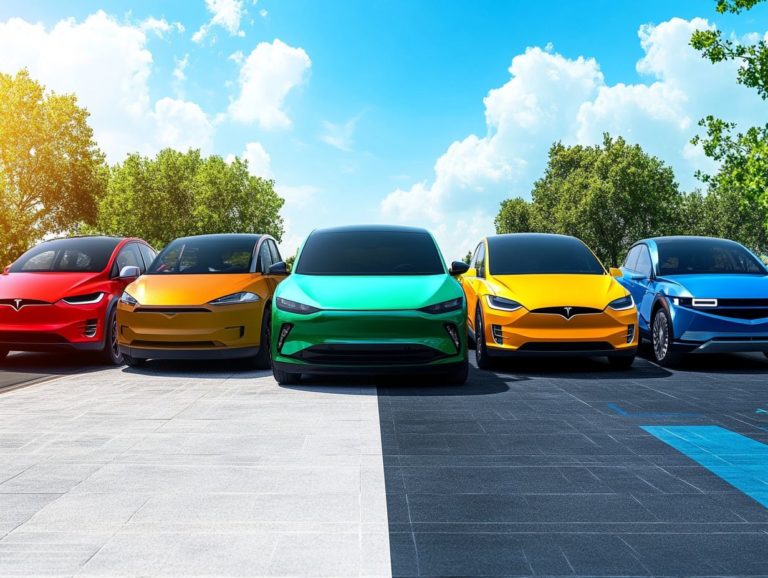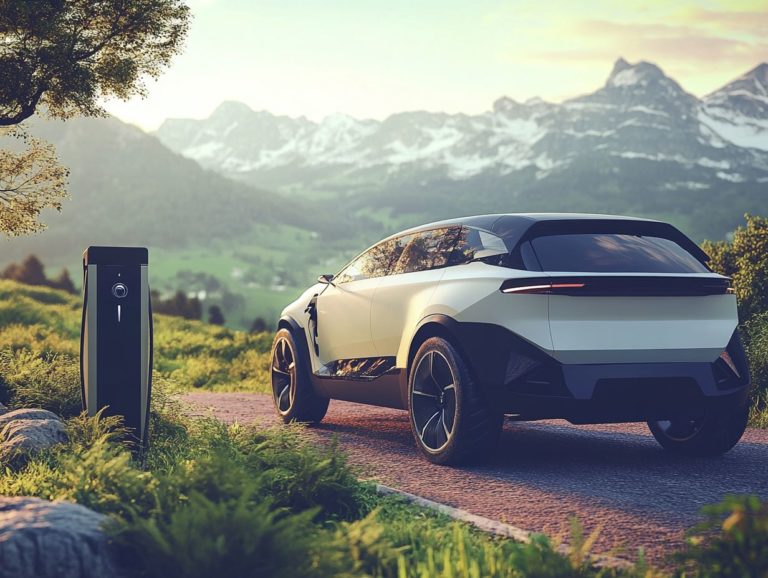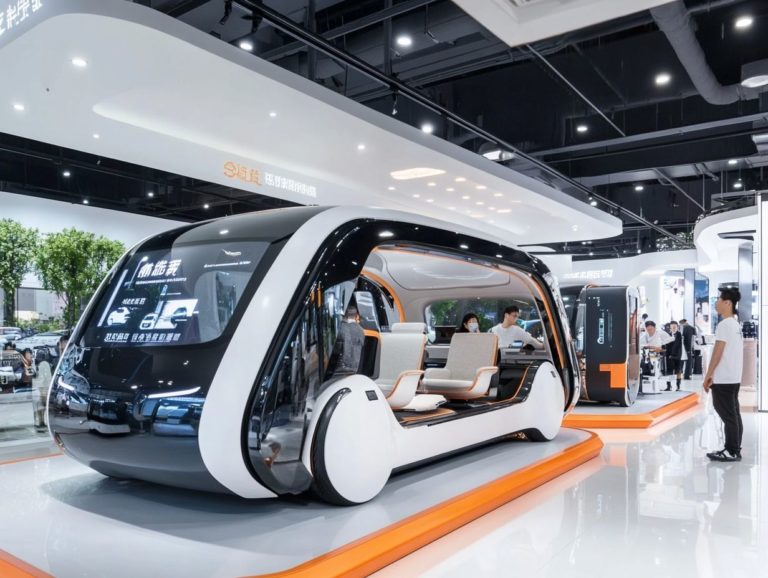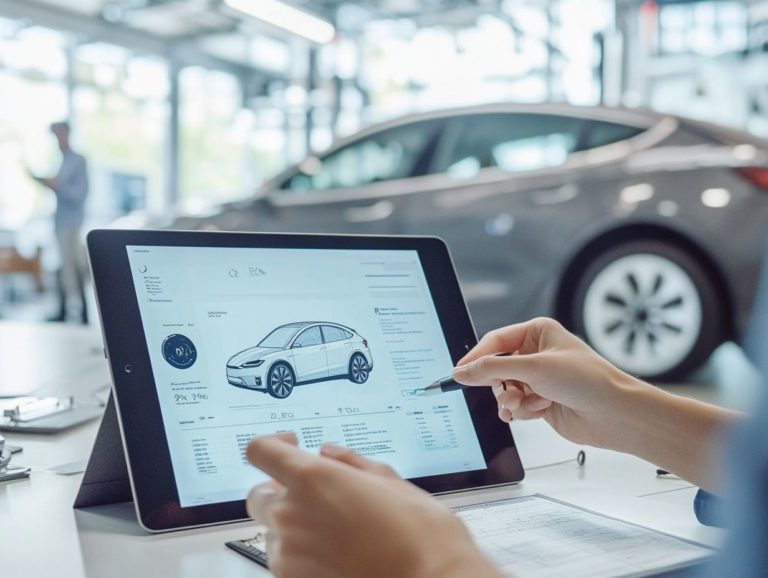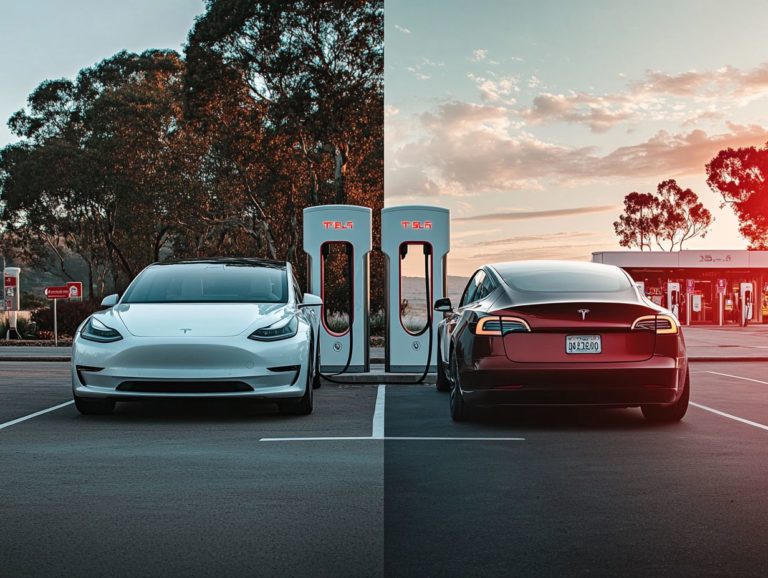Understanding the Different Types of EVs Available
Electric vehicles (EVs) are changing how we think about transportation. They offer cleaner and more sustainable options than traditional cars.
With a variety of options like Battery Electric Vehicles (BEVs), Plug-in Hybrid Electric Vehicles (PHEVs), and Fuel Cell Electric Vehicles (FCEVs), it s easy to feel overwhelmed. Each type has its own unique benefits and drawbacks.
Get ready to explore the amazing world of electric vehicles! This guide will take you through the different EV categories, examining their pros and cons. You’ll also discover tips for selecting the right one and gain insights into the exciting future of EV technology.
Whether you’re contemplating an upgrade or simply seeking knowledge, this information will equip you to navigate the EV landscape with confidence.
Contents
Key Takeaways:
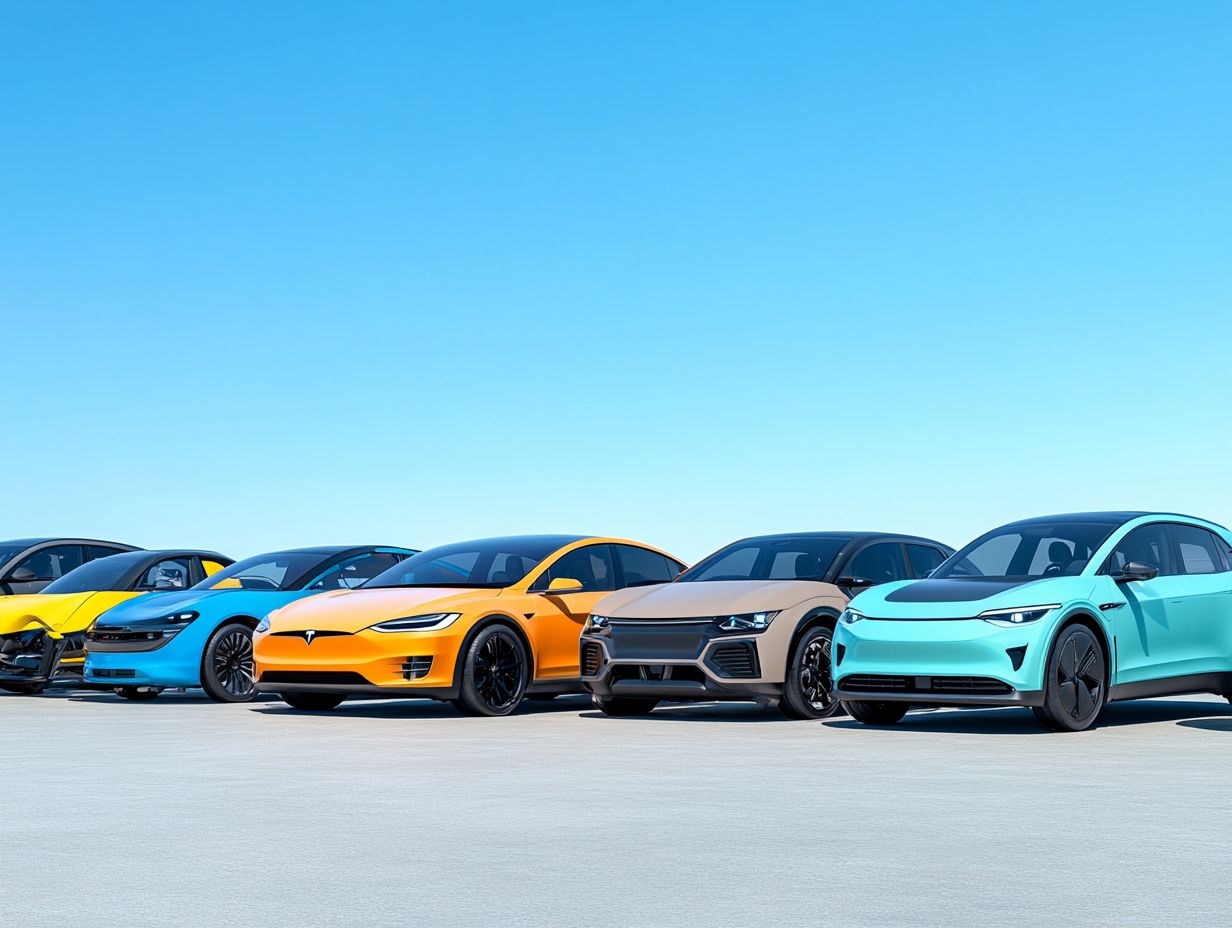
- Battery electric vehicles (BEVs) run solely on electricity and have zero emissions, making them a great choice for the environment.
- Plug-in hybrid electric vehicles (PHEVs) offer the best of both worlds with electricity and gas, giving you flexibility on the road.
- Fuel cell electric vehicles (FCEVs) use hydrogen to generate electricity, producing only water as a byproduct and providing longer ranges.
What are EVs?
Electric Vehicles (EVs) encompass a broad array of automobiles that harness electric power for propulsion, including Battery Electric Vehicles (BEVs), Plug-in Hybrid Electric Vehicles (PHEVs), and Fuel Cell Electric Vehicles (FCEVs). These innovations mark a transformative moment in the automotive landscape, where traditional internal combustion engines are increasingly complemented or replaced by electric motors aimed at reducing carbon emissions and fostering zero-emission driving.
Consequently, EVs not only pave the way for a sustainable future but also present you with a variety of modern, efficient and eco-friendly transportation options.
The environmental impact of these electric vehicles is significant; they typically generate far fewer greenhouse gases than their gasoline-powered counterparts, especially when charged with renewable energy sources. Thanks to advancements in charging infrastructure, it’s now more convenient than ever for you to charge your vehicle at home or while out and about.
EVs also have features like regenerative braking, a system that captures energy during braking to recharge the battery, extending their driving range. This highlights how electric vehicles not only fulfill the need for reliable transportation but also tackle urgent environmental issues, making them an appealing choice for the conscientious driver.
Types of EVs
Understanding the nuances of Electric Vehicles (EVs) is crucial as you navigate the dynamic landscape of the automotive industry.
The main categories to consider include:
- Battery Electric Vehicles (BEVs), which run exclusively on electric power;
- Plug-in Hybrid Electric Vehicles (PHEVs), which merge an internal combustion engine with an electric motor;
- Fuel Cell Electric Vehicles (FCEVs), which harness hydrogen fuel cells to produce electricity.
Each of these types offers distinct advantages and functionalities, catering to a range of consumer needs and preferences that you might find appealing.
Battery Electric Vehicles (BEVs)
Battery Electric Vehicles (BEVs) are the epitome of modern automotive innovation, relying entirely on electric motors powered by rechargeable lithium batteries. For those who prioritize sustainability, they represent an exceptional choice for zero-emission transportation.
You ll discover a host of advantages with BEVs, including remarkable efficiency and significantly lower operating costs compared to traditional internal combustion engine vehicles. Depending on the model, most BEVs offer a range of 150 to 350 miles on a single charge, effortlessly accommodating both your daily commutes and longer journeys.
The charging landscape has transformed dramatically, with urban areas and highways increasingly equipped with charging infrastructure for both regular and fast charging. Imagine being able to restore a substantial amount of battery life in just 30 minutes at a fast charging station, allowing you to recharge during brief stops without a hitch.
The environmental benefits of BEVs are significant, as they play a crucial role in reducing greenhouse gas emissions and air pollutants, paving the way for cleaner, healthier cities.
Plug-in Hybrid Electric Vehicles (PHEVs)
Plug-in Hybrid Electric Vehicles (PHEVs) seamlessly blend a traditional internal combustion engine with an electric motor, giving you the flexibility to transition between Gasoline and electric power. They boost efficiency and cut emissions.
With this innovative design, you can enjoy a much longer driving range compared to standard electric vehicles. PHEVs are fantastic for everything, whether you’re zipping around the city or embarking on a thrilling road trip, all while alleviating the anxiety of frequent recharging.
Equipped with features like regenerative braking, which captures energy during deceleration, PHEVs take fuel economy to the next level by reusing energy that would otherwise go to waste. Plus, the growing availability of dedicated charging infrastructure means you can recharge your vehicle with ease, making environmentally friendly commuting more convenient than ever without sacrificing the comfort of a traditional driving experience.
Fuel Cell Electric Vehicles (FCEVs)
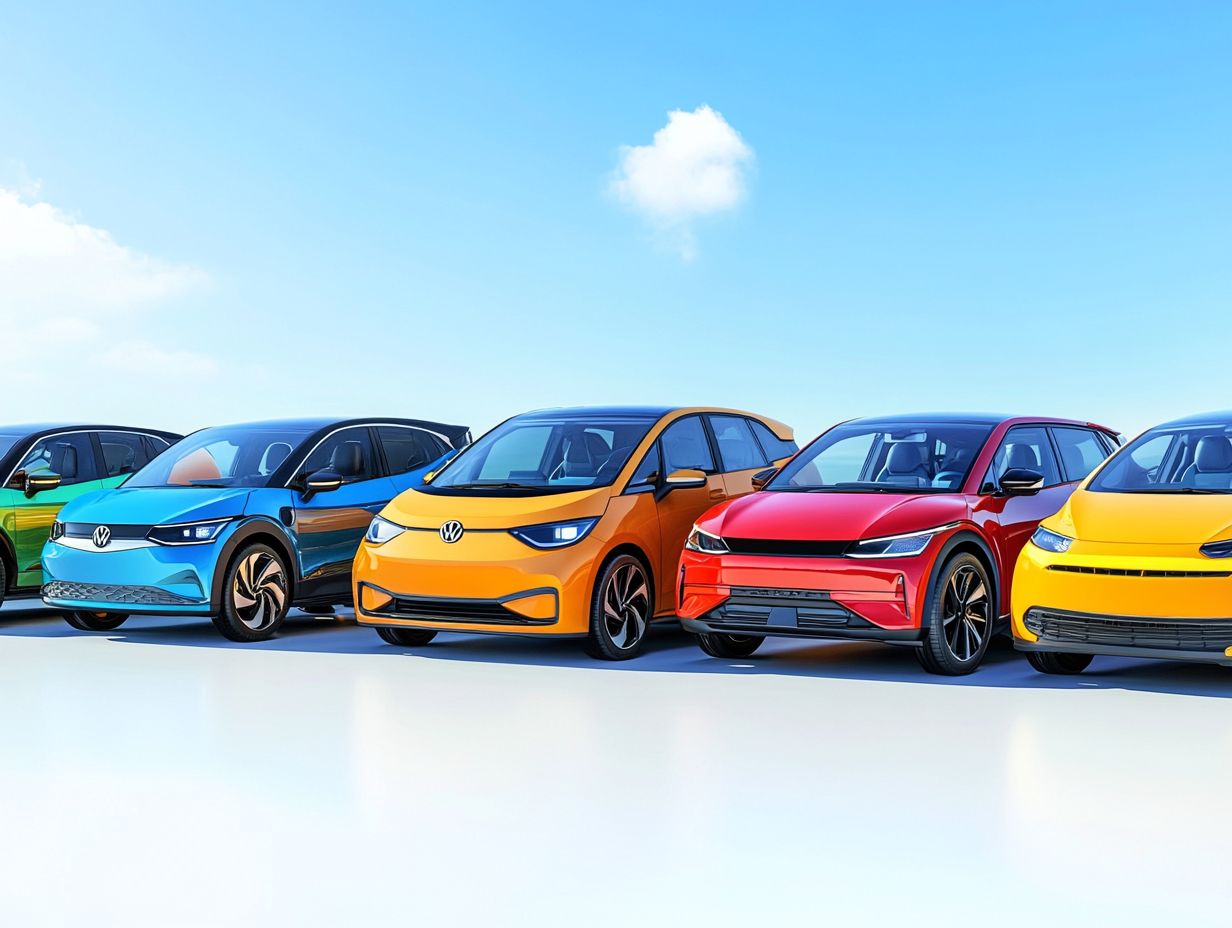
Fuel Cell Electric Vehicles (FCEVs) are at the forefront of electric mobility, using hydrogen fuel cells to generate electricity for driving. This innovative technology presents a zero-emission alternative to traditional vehicles.
These vehicles tap into hydrogen s potential as a clean energy source by converting it into electricity through a process that converts hydrogen into electricity, which then powers electric motors for propulsion. Embracing FCEVs is critical for a sustainable future!
FCEVs come with great benefits, such as longer driving ranges and quick refueling times compared to battery electric vehicles. However, challenges remain. The current infrastructure for hydrogen production and fueling is still limited. Sustainable methods for hydrogen generation need to be developed to facilitate widespread adoption. Effective energy storage solutions are also essential to ensure a stable supply chain for this emerging technology.
Advantages and Disadvantages of Each Type
When you contemplate Electric Vehicles (EVs), it’s essential to assess the advantages and disadvantages of each type Battery Electric Vehicles (BEVs), Plug-in Hybrid Electric Vehicles (PHEVs), and Fuel Cell Electric Vehicles (FCEVs). This careful evaluation will enable you to make an informed decision that truly aligns with your personal preferences and driving needs.
Pros and Cons of BEVs
BEVs offer many advantages, such as zero-emission driving, lower operating costs, and reduced maintenance needs. However, they do come with their own set of challenges, including a limited driving range and reliance on charging infrastructure.
For many drivers, the charm of BEVs lies in their eco-friendly appeal and the opportunity to save on fuel expenses. Charging times can vary significantly based on the station and battery pack capacities; some fast chargers can deliver a substantial charge in under an hour, while standard home chargers might require several hours for a complete fill-up.
It’s essential to consider how these vehicles perform in real-world scenarios. Factors like climate, driving style, and terrain can greatly influence effective range, leading to that familiar feeling of range anxiety when planning longer trips.
Pros and Cons of PHEVs
Plug-in Hybrid Electric Vehicles (PHEVs) offer a distinctive blend of benefits, such as flexibility in fuel sources and an extended driving range. However, they also present challenges like higher initial costs and potential inefficiencies in hybrid operation.
This duality makes them particularly appealing if you want to enjoy the perks of electric driving without sacrificing the convenience of traditional gasoline power during longer journeys.
In various driving conditions whether navigating city traffic, where electric-only mode excels, or cruising on highways, where gasoline engines take over the adaptability of PHEVs shines.
Unlike fully electric vehicles (EVs), which can leave you worrying about running out of battery on long trips, PHEVs offer a reassuring safety net, allowing you to switch to gasoline when necessary. However, their complex systems may lead to less efficient operation compared to fully electric options. Therefore, you should carefully consider the advantages alongside the intricacies and costs involved.
Pros and Cons of FCEVs
Fuel Cell Electric Vehicles (FCEVs) are celebrated for their rapid refueling times and impressive driving ranges. However, these vehicles face significant challenges, such as a scarcity of hydrogen fueling stations and steep production costs.
This intriguing duality positions FCEVs as a noteworthy option for sustainable transportation solutions. They release only water vapor, making a strong case for lowering carbon footprints.
The technology’s success depends on establishing a solid hydrogen infrastructure, which is still developing in many regions. Current manufacturing processes can also be resource-intensive and pricey, contributing to the higher purchase price of FCEVs.
Navigating this balance between benefits and challenges is essential for everyone involved as they strive to overcome the hurdles to widespread acceptance.
Choosing the Right EV for You
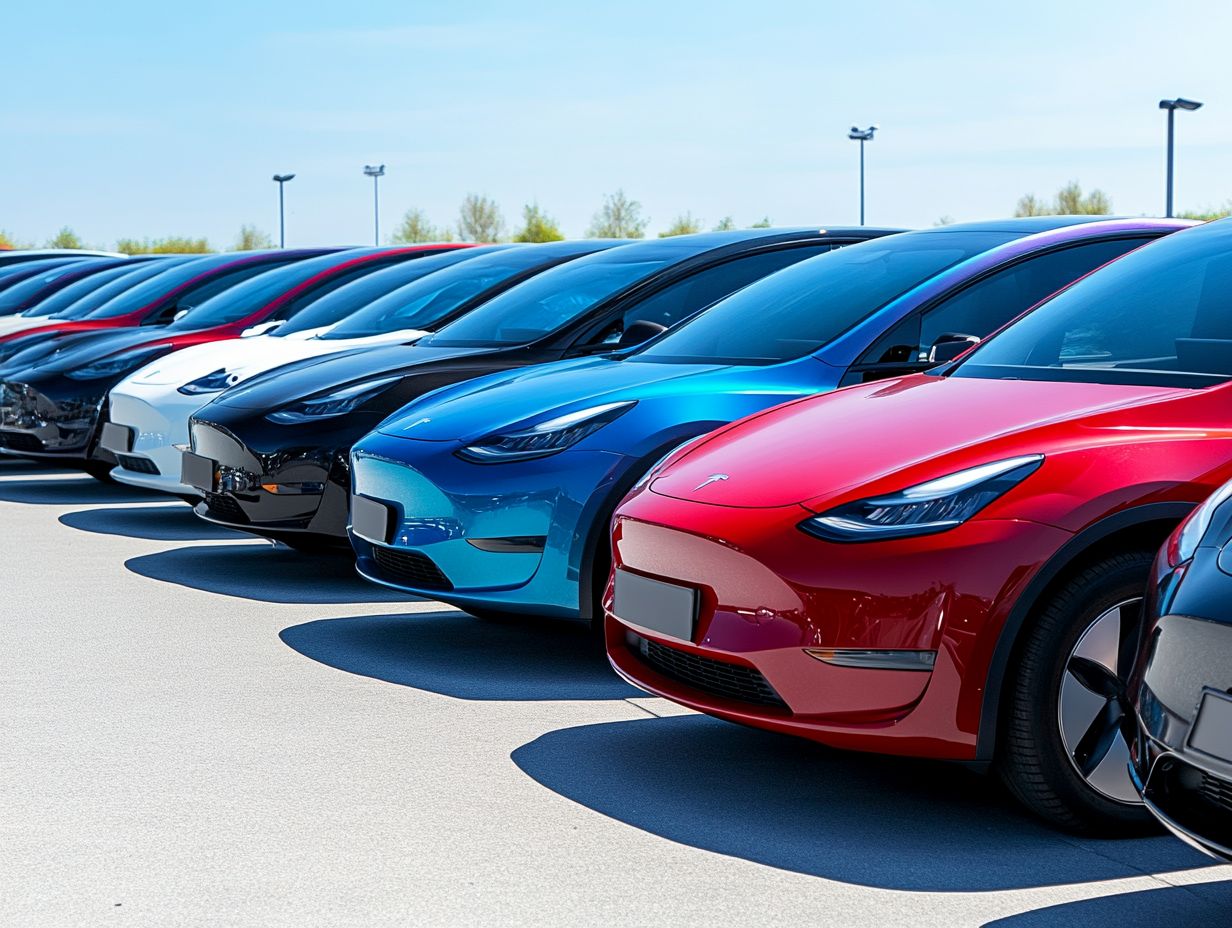
Selecting the ideal Electric Vehicle (EV) requires thoughtful consideration of several key factors. Your unique driving needs, budget constraints, and sustainability preferences will guide you toward the most suitable option, whether it s a Battery Electric Vehicle (BEV), a Plug-in Hybrid Electric Vehicle (PHEV), or a Fuel Cell Electric Vehicle (FCEV).
Each choice presents its own set of advantages. Taking the time to evaluate them will lead you to the perfect fit for your lifestyle.
Factors to Consider
- Availability of Charging Infrastructure: Check the availability of charging stations at home and along your regular routes.
- Driving Range: Understand the driving range of different models, as it affects practicality for longer journeys.
- Total Cost of Ownership: This includes buying price, maintenance, and energy costs, giving you a comprehensive view of the economic implications.
- Sustainability Preferences: Consider your personal values regarding eco-friendly materials and brands with ethical practices.
Future of EVs
The future of Electric Vehicles (EVs) promises to be exceptionally bright, fueled by swift technological advancements and a growing consumer appetite for sustainable transportation solutions.
These developments are set to reshape the automotive industry, offering you an exciting glimpse into a greener and more innovative driving experience.
Imagine driving a cleaner car! Explore more about EVs and find resources to help you choose the right one for you.
Technological Advancements and Predictions
Recent advancements in technology are changing the Electric Vehicle (EV) market. Key areas include battery technology and charging solutions.
Innovations like solid-state batteries promise to improve energy capacity and safety. This means better driving range and performance for your EV.
Developments in hydrogen fuel cells are also emerging as a strong alternative. They use clean energy for longer journeys, producing only water as a byproduct.
These exciting breakthroughs are transforming how we think about transportation! They guide you towards eco-friendly options that meet consumer demands.
Frequently Asked Questions
What are the different types of EVs available?
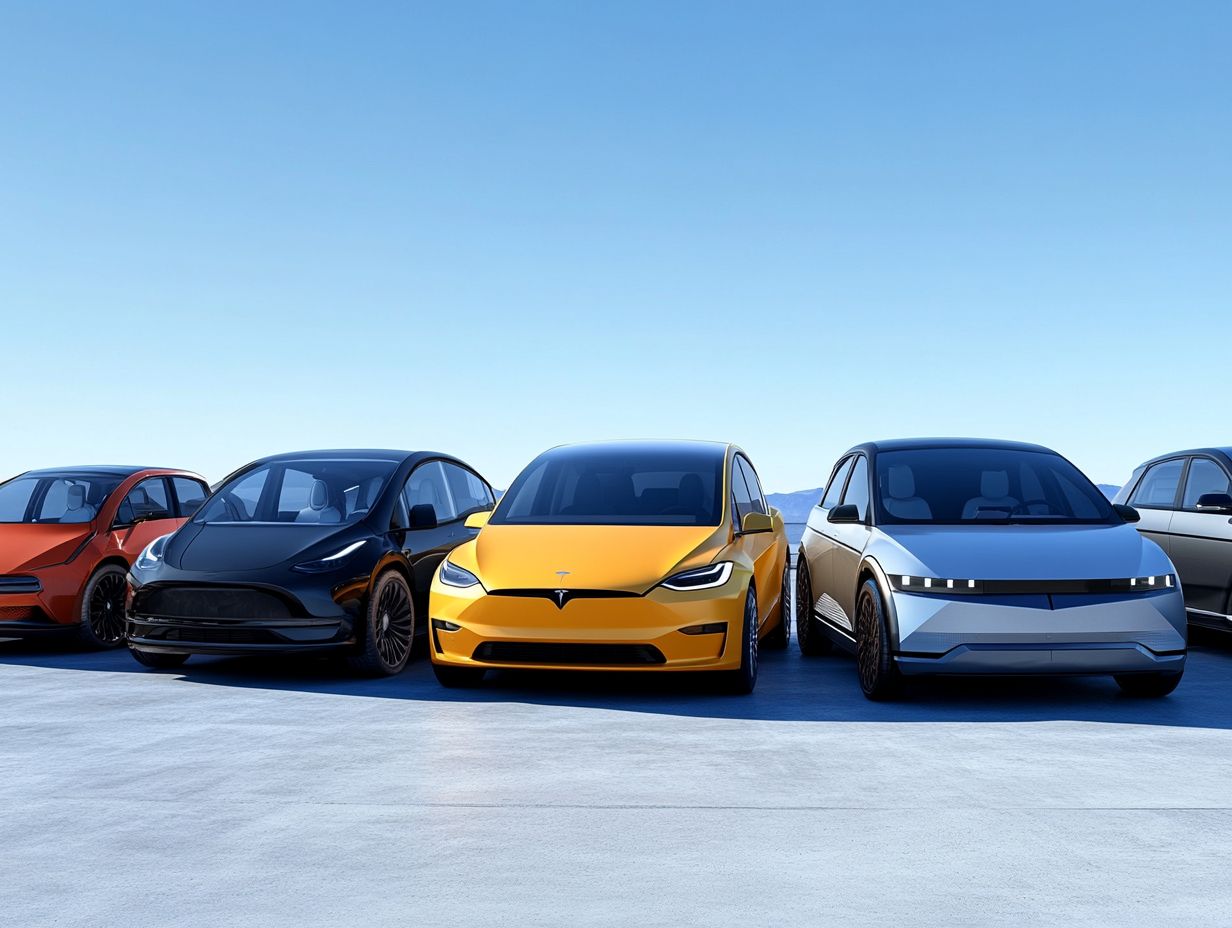
The different types of EVs available are Battery Electric Vehicles (BEVs), Plug-in Hybrid Electric Vehicles (PHEVs), and Hybrid Electric Vehicles (HEVs).
What is a Battery Electric Vehicle (BEV)?
A BEV is an electric vehicle powered solely by an electric motor. It does not have a gasoline engine and runs entirely on electricity, needing to be charged using a charging station or wall outlet.
How is a Plug-in Hybrid Electric Vehicle (PHEV) different from a BEV?
A PHEV has both an electric motor and a gasoline engine. This allows it to run on both electricity and gasoline, giving you the flexibility to charge through a charging station or wall outlet while using gasoline when needed.
What is a Hybrid Electric Vehicle (HEV)?
An HEV combines both an electric motor and a gasoline engine to power the vehicle. Unlike a PHEV, it cannot be charged through an external source and relies solely on regenerative braking to recharge the battery.
Which type of EV is best for me?
The best type of EV for you depends on your specific needs and preferences. If you have a short daily commute and access to charging stations, a BEV might be a good option. For more flexibility and longer range, consider a PHEV. If fuel efficiency is your priority, an HEV could be a great fit.
Do EVs have the same performance as traditional gasoline vehicles?
Yes, EVs can match or even exceed the performance of traditional gasoline vehicles. They offer instant torque and acceleration, making them quick and responsive on the road. However, performance may vary depending on the type and model of the EV.

